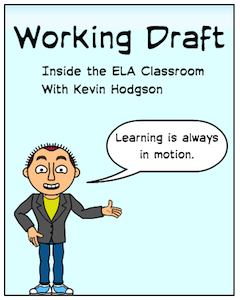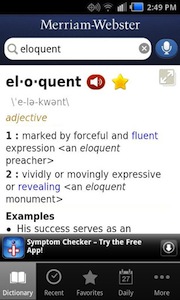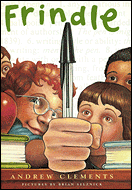Why This Digital Teacher Loves Paper Dictionaries
A MiddleWeb Blog
 The topic of dictionaries came up in assorted conversations in the past few weeks, reminding me both of the power of those esteemed books of words, as symbols of thought and scholarship, and the ways in which technology is completely altering the ease and means of how we find information when we need it.
The topic of dictionaries came up in assorted conversations in the past few weeks, reminding me both of the power of those esteemed books of words, as symbols of thought and scholarship, and the ways in which technology is completely altering the ease and means of how we find information when we need it.
This latter point is no doubt obvious to anyone who spends time in a school or is at home with a child of a certain age. My sixth grade students rarely reach for the pile of dictionaries that I have in my classroom anymore, unless instructed to do so. They itch to use the computer to look up words.
So I — the word nerd that I am — was pleasantly surprised the other day when, as we were working on some poetry, I witnessed a handful of students in each of my classes wandering over to use our bound, electricity-free, no-tech thesauruses and dictionaries as they were seeking “just the right word” for their writing.

While most students agreed that, given the choice, they would first reach for technology if it were available. But there were a few passionate defenders of the dictionary as an honored book on the shelf, including one young writer who noted that she liked to “stumble across words, and you can’t do that with a website.”
Here, here!
Words with the Mothers’ Club
Interestingly, another conversation about dictionaries took place during a recent presentation I gave about digital citizenship and Internet safety with a Mothers’ Club in the small town where I teach. This group of mothers and grandmothers is very active in local politics, and its members have been strong supporters of our school.
Before I began my talk about youth and the digital world, I thanked them for a gift they give every year to all of our sixth graders as they leave our elementary school to move on to the regional middle and high school: a Merriam-Webster Collegiate Dictionary.
It’s a huge, thick, red tome that is presented each year to every single sixth grader during our Recognition Night ceremonies in June. The Mothers’ Club covers the cost of the dictionaries (which, as you can imagine, is quite a bill when there are 80 dictionaries to buy each year). Each student’s name is elegantly printed on the inside of the book.
It’s quite a sight to look up on our stage at the end of the night, seeing all those students in their fancy clothes carrying dictionaries as tokens of their time at our school.
But, as you can imagine, there are discussions ensuing among us teachers and, as it turns out, among members of the Mothers’ Club, about whether dictionaries are still an apt parting gift for student scholars who are more likely to turn to their cell phone to find the meaning of a word than they are to open up their shiny red book. Some wonder if a flash drive would be more relevant? Or some other book? Does the dictionary still have meaning?
What would Mrs. Granger do?

Yes, it might not get used all that often. It might sit there on the bookshelf for long stretches of time. It might collect some dust. But the dictionary is a solid reminder of their educational journey at our school, and, as Mrs. Granger — the fictional teacher in Andrew Clements’ wonderful book about the invention of words, Frindle — notes, words have power. The dictionary is the place that holds those words together as common knowledge. We should cherish the way a dictionary documents our language and stories.
Frindle: Words from Mr. Hodgson on Vimeo.
The Crazy Collaborative Dictionary
Finally, not long ago, as we were studying the origin of the English Language, my students were learning about the development of the dictionary from a historical perspective. We studied where words come from, how they stand the test of time, and how modern culture always impacts our use of language.
Students then contributed their own invented words to an ongoing venture called the Crazy Collaborative Dictionary. This wiki-based project allows for cross-year collaboration of sixth graders, and demonstrates how dictionaries are continually in the midst of change over time. Each year, they add new words to the list, and the dictionary project now totals more than 800 invented words over a nine-year period.
Yes, the Crazy Collaborative Dictionary is online. But who knows? Maybe someday, one of my students will be looking through a physical dictionary and “stumble upon” one of our invented words that took hold and become part of the lexicon. It could happen, right? One can hope.





































I, too, love the symbolism of those bright red, tangible dictionaries in the hands of the young scholars. Of course, it should be noted that this comment comes from someone who still keeps her own well-worn Merriam-Webster’s out on her desk and who reaches for it often in spite of all the technology at her fingertips.
Thanks, Moira, for stopping by. And may your dictionary always be your kind desk companion.
:)
Kevin
I loved this piece, Kevin. I grew up in a home with an enormous grosgrain covered dictionary and fondly remember my mom regularly looking up words to share with us. It was such a wonderful escape for her and she did it with such relish and excitement that I was captivated.
Thank you for taking the time to write. I wonder about the love of discovery, and how it is changing in this digital age. I don’t think it is disappearing, but it certainly is changing. I feel like we’re straddling two different time zones. The dictionary is still one of those comfortable anchors (or maybe I am old school still)
Kevin
I agree with all that you write and I too have a roomful of kids who love stumbling across words.
There is one thing mentioned in your blog that is outmoded, though: the Mothers’ Club! Wonderful mothers, no doubt, and a generous program, absolutely. But even if all the kids in your school have mothers at home with them, it is time for them to expand their view of possibilities for parenting and guardian-taking. Why not the Families Club or Parents Club or Supporting Our Students in School Club?
I can’t really answer that, Jen, but you make excellent points. I think it some long-held tradition of sorts in the town. I suspect it was established to give women (or mothers, anyway) a space away from the men. But I don’t know …
I wanted a fun activity for the last 5 minutes of class yesterday, so I used my “old school” hardback dictionary and my interactive white board: I opened the dictionary randomly, chose a strange word, and then put up four definitions for the word (1 true / 3 elaborate fiction). Students voted on the correct definition! Fun, not possible with dictionary.com
That’s a great activity, Marti. I’ve some similar (based on the two truths and a lie game), and the mix of new and established technologies is neat.
My middle school classroom has a laptop at each seat (donated by a local company when they upgraded theirs – I get to maintain them) and a red Webster’s Collegiate dictionary. One of my students years ago competed in a vocabulary contest. The key to his success, according to him, was his knowledge of word parts. We often look up words, examine the etymology, and then look before and after the entry word to find other words from the same root. That’s not easily done on a digital dictionary. They do have Merriam-Webster’s app on their tablets. It at least has they etymology. It’s also fun to look for archaic terms in the dictionary.
Dictionaries are beautiful. For many reasons. Tangible and elegant. Love them.
Thanks for stopping by, and sharing the beauty of the books of words, Kathleen.
I have, and will always love dictionaries…and Mrs. Granger…ever since the first time we read Frindle aloud. We have read it every year since! Thanks for the reminder, Kevin.